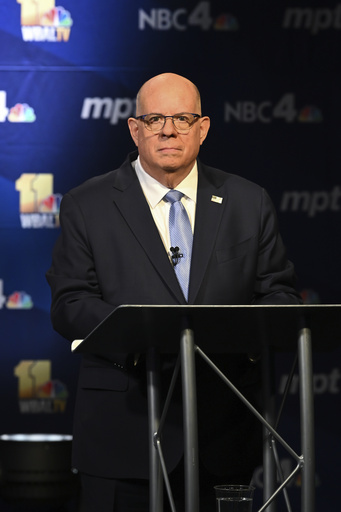In a recent debate broadcast on Maryland Public Television, Democratic candidate Angela Alsobrooks challenged former Governor Larry Hogan’s commitment to abortion rights, arguing that his actions during his time in office contradict his current claims. This discussion took place during a high-stakes Senate race in Maryland, where both candidates aim to sway voters in a state that typically leans Democratic.
Alsobrooks specifically pointed to Hogan’s 2022 veto of a bill intended to expand abortion rights, which would have allowed nurse practitioners, nurse midwives, and physician assistants to perform abortions, a change from the existing law that limited these procedures to physicians only. The Maryland legislature ultimately overrode Hogan’s veto, ensuring the bill’s enactment. “When he had the chance to support the women of Maryland, he chose not to,” Alsobrooks asserted, emphasizing Hogan’s refusal to allocate funding necessary for training additional abortion care providers just two years prior.
In response, Hogan defended his position, stating that he supports abortion rights but had concerns about allowing non-physicians to perform such medical procedures. He expressed disappointment regarding Alsobrooks’ interpretation of his actions, calling it misleading. “It’s insulting to lie about something so significant,” Hogan remarked, explaining that his veto was aimed at preserving the safety and protection of women.
Alsobrooks countered Hogan’s arguments by stating that if he were to win the Senate race, any chance of passing legislation to codify Roe v. Wade would be nullified. “Should he give Republicans a majority in the Senate, there would be no action on Roe,” she insisted.
In addition to the abortion rights debate, Hogan claimed he would bring an independent voice to the Senate, distancing himself from partisan politics. “You’ll only hear a narrative of red vs. blue,” he said, reiterating his focus on what is best for the country beyond party lines.
Alsobrooks challenged this assertion, arguing that Hogan’s willingness to enter the race at the behest of GOP leadership indicated a lack of true independence. “When Mitch McConnell called him, he essentially joined the team,” she argued, referring to the Senate Minority Leader.
This election cycle is capturing national attention due to its competitiveness in a state known for its solid Democratic majority. Currently, Democrats hold a slim 51-49 advantage in the Senate, which includes independents who typically align with Democrats. With 23 out of 33 Senate seats up for grabs nationwide this November, the stakes are high for both parties.
On the subject of Supreme Court reform, the candidates also expressed opposing views. While Alsobrooks supports potential reforms such as adding justices or implementing term limits, Hogan cautioned against politicizing the court. He decried any efforts that might undermine the judiciary’s integrity.
If elected, Alsobrooks would make history as Maryland’s first Black U.S. senator, bringing the experience of her role as the county executive of Prince George’s County, which ranks as Maryland’s second-largest jurisdiction. Although historically, Republican candidates have struggled to secure Senate seats in Maryland—having not won in over four decades—Hogan’s reputation as a well-known figure may present a challenge to this trend.
The popularity of Hogan, a two-term governor, has translated into successful statewide campaigns, where he captured the support of both parties’ voters in past elections. Nevertheless, he faces a unique challenge this year, as his campaign aligns with the contentious presence of former President Donald Trump on the ballot, a figure who has generated significant disapproval in Maryland. Despite being a vocal critic of Trump within the GOP, Hogan’s stance may not sit well with all Republican voters, raising additional hurdles in his campaign.
Furthermore, Alsobrooks has addressed concerns surrounding her tax credits, assuring voters that she repaid a tax benefit she mistakenly claimed for two residences, and is in the process of addressing related interests owed. She highlighted her proactive approach upon discovering the discrepancies. “I reached out to resolve the matter as soon as I became aware of it,” she explained.
During the debate, Hogan faced inquiries regarding his past decisions, which included opting not to vote for Trump in previous elections. He reiterated his stance that many Americans feel disenchanted with the current leadership choices. Hogan’s refusal to cast his ballot for Trump, and instead voting for a former president, prompted Alsobrooks to label such a decision as disqualifying for someone seeking office in the Senate. “This reflects his inability to make difficult choices,” she said, arguing it indicates how he might approach controversial issues as a senator.


